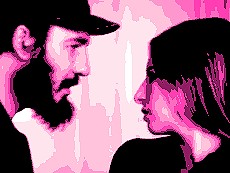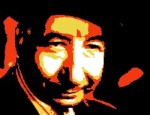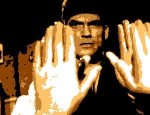Film Review
Irvin Kershner's characteristically eccentric adaptation of Anne Roiphe's
best-selling 1970 novel
Up the Sandbox afforded Barbra Streisand one
of her most sympathetic screen roles and gave a more tender and thoughtful
edge to the sexual revolution that was hammering down on society in the late
'60s, early '70s. As the modern married woman craving more than cosy
domesticity, Streisand takes a bold stand against stereotypical representations
of contemporary feminism and shows that the quandary faced by women of her
generation is a far more complex and unsettling existential matter than a
mere clamouring for equal rights with men. The heroine of
Up the
Sandbox is seen flailing helplessly in a maelstrom of confusion - the
result of outdated social expectations about housewives colliding with trendy
notions of what young women should now aspire to in an age which values the
rights of the individual above the needs of society. The film may not
be subtle or particularly sophisticated, but it touched a nerve when it was
first seen in 1972 and it still feels acutely pertinent, many years after
that second wave of feminism came crashing onto the granite beach of bourgeois
male complacency.
Likeable and timely as it was,
Up the Sandbox is by no means Kershner's
finest work, although it probably deserves far more consideration than his
later Hollywood blockbusters that made his name -
Star Wars: The Empire Strikes
Back (1980),
Never Say
Never Again (1983) and
RopCop 2 (1990). Despite being
as near to the Zeitgeist as a work of art can possibly get, the film struggled
to turn a profit on its initial release. This was partly because a
large chunk of its generous three million dollar budget was needlessly squandered
on a costly location shoot in Kenya, for the filming of one of the heroine's
wild fantasy sequences - an expedition to Africa in search of a technique
for painless childbirth. This lengthy digression into self-indulgent
Rider Haggard pastiche adds nothing to the film and now appears crass and
offensive; if only Kershner had had the good sense to excise it, the film
would have benefited greatly.
Fortunately, the yawn-inducing African entry in a series of
Walter Mitty-like excursions
is the one notable flaw in an otherwise thoroughly enjoyable romp, one that
allows Streisand to turn in one of her more engaging and convincing comedy
performances as a thoroughly modern miss torn between her domestic duties
as a young mother and her yearning for personal fulfilment outside the family
home.
Up the Sandbox eschews the usual feminist militancy in
favour of something much gentler and, far more palatable - the kind of social
satire that hits home more effectively than any amount of well-meaning women's rights
tub-thumping. The film is smart and funny - and as wildly unpredictable
as its director, pepped up by the occasional surreal escapade of the kind
that abounds in
Woody Allen's early films.
The best of these is the sequence in which a Fidel Castro look-a-like attempts
to seduce Streisand, revealing some surprising hidden assets as he/she does
so.
The film's highpoint is an anniversary party which starts out as a typically
naff home video recording of a perfect family gathering before developing
into an apocalyptic battle between bourgeois conformity and female emancipation
at its most deliriously cartoonish. This sudden descent into taboo-demolishing
anarchy seems to prefigure the entire counter-culture movement of the 1970s,
with the old values and attitudes exposed as tawdry flim-flam deserving to
be torn down and stamped on, in the manner of a chaotic Mack Sennett farce.
Up the Sandbox is far from being a polished piece of cinema.
It does however make up for its jarringly uneven structure and ill-conceived
African detour with its far better judged comic set-pieces and untiring sense
of fun. Kershner earns his auteur spurs in the seductively stylish,
entirely visual ending to his film, which conveys far more about Margaret's
impossible dilemma than any quantity of well-meaning dialogue.
© James Travers 2023
The above content is owned by frenchfilms.org and must not be copied.
Film Synopsis
On the face of it, Margaret Reynolds has nothing to complain
about. She is a happily married mother of two leading a comfortable, if slightly
humdrum, existence in New York City. The discovery that her husband
is seeing another woman coincides with the news that she is pregnant for
a third time, and this prompts her into taking stock of her life. Is
she really as happy as she seems? Is there perhaps something missing
from her life? Unable to confide in her constantly preoccupied husband,
Margaret begins having a series of increasingly bizarre fantasies which see
her intellectually and physically molested by an ambisexual Central American
dictator in the Fidel Castro mould and then participate in a masterfully
contrived terrorist plot to blow up the Statue of Liberty.
Margaret's inner turmoil is aggravated many times over when her well-meaning
mother-in-law begins pressurising her to move with her young family to the
suburbs so that she can fulfil the role of the model housewife more completely.
The young wife realises that she is fast approaching a dangerous crisis point
in her life. How can she reconcile her desire for greater personal
freedom with her unstinting devotion to the family she adores? Does
she even have a right to choose?
© James Travers
The above content is owned by frenchfilms.org and must not be copied.



